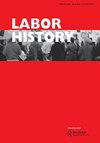土耳其工会联合会的女工教育:挖掘与国际劳工联合会跨国合作的历史
IF 0.7
4区 管理学
Q1 HISTORY
引用次数: 0
摘要
摘要本文探讨了土耳其工会联合会(t本文章由计算机程序翻译,如有差异,请以英文原文为准。
Women workers’ education at the Confederation of Turkish Trade Unions: excavating histories of transnational collaboration with the ICFTU
ABSTRACTThis article explores the relationship between the Confederation of Turkish Trade Unions (Türk-İş) and the International Confederation of Free Trade Unions (ICFTU) from the 1960s until the 1990s with a focus on the transnational collaboration of activists who organised educational activities for women workers and trade unionists to empower them as rights-seeking political subjects and strengthen their position within the trade union movement. Demonstrating how women’s trade union education evolved within the framework of local politics as well as global processes such as the Cold War and the emergence of a UN-led gender equality regime, it argues that global inequalities, geopolitical differences, and Türk-İş leaders’ ambivalent attitude towards women’s status in the trade union movement led to a loose, sporadic relationship between local activists and those from the west. At the same time, it was often these activists’ sustained efforts towards collaboration and the circulation of their agendas that pressured Türk-İş to invest in women’s empowerment in trade unions. Utilising archival and trade union sources as well as oral history interviews, the article integrates the work of women labour activists in feminist labour historiography, offering a more comprehensive understanding of trade unions’ gender politics in Turkey and globally.KEYWORDS: Feminist labour historyICFTUtrade union educationtransnational collaborationTurkeyTürk-işwomen’s labour activism AcknowledgmentsThe author thanks Sylvia Hahn, Silke Neunsinger, Mahua Sarkar, and the ZARAH research team, and the two anonymous reviewers for their constructive criticism and valuable comments on the earlier versions of the article.Disclosure statementNo potential conflict of interest was reported by the author(s).Additional informationFundingThis article is part of the ERC-funded project ‘ZARAH: Women’s labour activism in Eastern Europe and transnationally, from the age of empires to the late 20th century’ (Advanced grant no. 833691).Notes on contributorsSelin ÇağataySelin Çağatay is a postdoctoral researcher in History and Gender Studies at the Central European University, Austria. Her recent publications have appeared in Women’s History Review, International Feminist Journal of Politics, and the Palgrave Macmillan Thinking Gender in Transnational Times series. Currently she investigates educational activities targeting urban and rural women in the world of gainful work in Turkey and transnationally.
求助全文
通过发布文献求助,成功后即可免费获取论文全文。
去求助
来源期刊

Labor History
Multiple-
CiteScore
1.00
自引率
28.60%
发文量
44
期刊介绍:
Labor History is the pre-eminent journal for historical scholarship on labor. It is thoroughly ecumenical in its approach and showcases the work of labor historians, industrial relations scholars, labor economists, political scientists, sociologists, social movement theorists, business scholars and all others who write about labor issues. Labor History is also committed to geographical and chronological breadth. It publishes work on labor in the US and all other areas of the world. It is concerned with questions of labor in every time period, from the eighteenth century to contemporary events. Labor History provides a forum for all labor scholars, thus helping to bind together a large but fragmented area of study. By embracing all disciplines, time frames and locales, Labor History is the flagship journal of the entire field. All research articles published in the journal have undergone rigorous peer review, based on initial editor screening and refereeing by at least two anonymous referees.
 求助内容:
求助内容: 应助结果提醒方式:
应助结果提醒方式:


